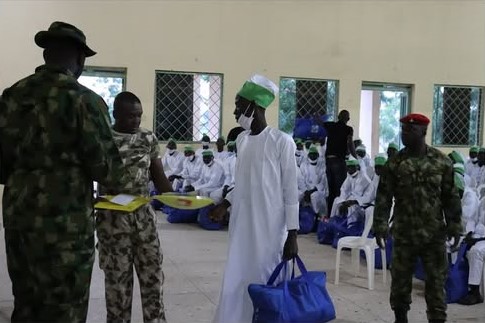
The Nigerian government has reintegrated over 5,000 former Boko Haram fighters into society through its Operation Safe Corridor (OSC) deradicalization program.
This was disclosed by Ambassador Mairo Musa Abbas, Head of Preventing and Countering Violent Extremism (PCVE), during the Lake Chad Basin Governors’ Forum.
She stated that none of the rehabilitated individuals have returned to violent extremism within six months of completing the program.
“Under Operation Safe Corridor programme, we have deradicalized over 5,000 ex-combatants of Boko Haram and reunited them with their families. They are using the skills they have acquired in the six months of deradicalization programme in the camp, to sustain themselves within the communities.
“Our collaborators from the National Orientation Agency (NOA) are within 774 local governments in Nigeria and traditional & religious leaders within the community they have monitoring mechanism where are able to monitor this mechanism and see their progress after the reintegration within the community.”
- Boko Haram IED Explosion on Borno Road Kills Eight, Wounds Others
- EFCC Opens Probe of 24 Nigerian Young Men Detained in Ghana over Suspected Cybercrimes
- Former CBN Governor Emefiele Attempts To Regain Forfeited Abuja Estate; Court Dismisses the Attempt
- King Sunny Ade’s House Divided as Daughter Alleges he has Been Kidnapped; Other Family Members Deny Claim
- You Can Gather All Governors But If Nigerians Reject You, it is Over — El-Rufai Tells Tinubu
- Woman Leaves Husband after Falling in Love with ChatGPT
Operation Safe Corridor, established in 2016, provides a structured six-month rehabilitation process, where ex-militants receive psychological counseling, vocational training, and civic education before reintegration into their communities.
The initiative aims to weaken Boko Haram’s operational strength by offering a path for defectors to return to civilian life.
However, the program has sparked debate. While government sources claim success, security analysts warn that some ex-fighters may relapse. Experts, such as Senator Iroegbu, argue that repentance is “a thing of the mind,” meaning some participants could pretend to reform due to circumstances.
Additionally, in 2021, Borno State Governor Babagana Zulum called for a review of the program, citing concerns that some rehabilitated individuals acted as spies and later rejoined Boko Haram.
Community resistance also remains a challenge. Many residents of Borno, Adamawa, and Yobe, states worst hit by Boko Haram’s insurgency, have expressed distrust toward reintegrated fighters.
Activist Vivian Bellonwu of Social Action Nigeria pointed out that while former militants receive extensive rehabilitation, communities devastated by their actions often do not get the psychological support they need.
Many survivors, including women who were abducted or raped, struggle to accept former fighters back into society.











